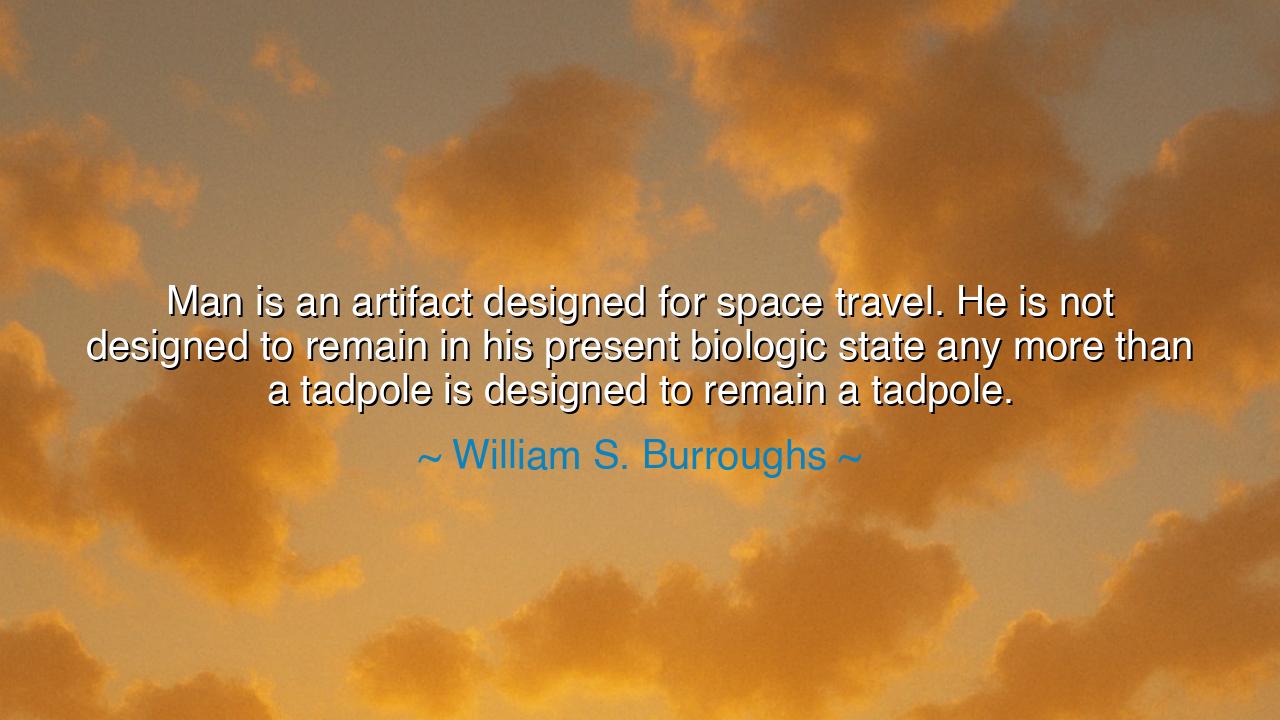
Man is an artifact designed for space travel. He is not designed
Man is an artifact designed for space travel. He is not designed to remain in his present biologic state any more than a tadpole is designed to remain a tadpole.






In the vast expanse of existence, where time stretches like an endless river, the human being has always stood as a creature of potential, a being caught between the realms of earth and stars. And yet, the words of William S. Burroughs ring out like a challenge to all who listen, urging us to consider the true nature of our being. He said, "Man is an artifact designed for space travel. He is not designed to remain in his present biologic state any more than a tadpole is designed to remain a tadpole." These words, filled with both wisdom and provocation, beckon us to look beyond the confines of our current form and consider the great purpose for which we were created.
Burroughs speaks not of the present, but of a future that lies within our grasp. A future where the heavens, once the domain of gods and legends, will become the realm of human exploration. We were born, it seems, to transcend the limits of our physical bodies. Just as the tadpole is destined to transform into the mighty frog, so too are we destined to break free from the constraints of our biological form and reach toward the stars. The human race, it would seem, is not meant to dwell in the dirt of the Earth, but to soar across the cosmos, to evolve into something greater, something beyond what we are now.
Let us reflect upon the tale of Icarus, the young man who, with wings crafted of feathers and wax, sought to fly toward the heavens, only to fall into the sea. His wings, though wondrous, were bound by the limits of their design, and in the end, he was undone by his own ambition. But in Icarus’s fall lies a profound lesson: we too must evolve beyond our present limitations. His wings were only meant for the Earth, but we, like Icarus, are meant for the skies—not through a simple ascent, but through an evolution that frees us from the limitations of our bodies. Burroughs’s words are a reminder that, like the tadpole, we cannot remain in our current form forever. We must adapt, grow, and transform if we are to achieve our higher purpose.
It is not merely in the world of myth that we see such a vision realized. In the realm of the modern world, consider the story of Yuri Gagarin, the first human to journey into space. Gagarin, like the explorers of old, transcended the limits of his earthly existence to reach the heavens, to touch the unknown. His journey was not simply one of discovery, but of transformation, a symbol of the very potential that Burroughs spoke of. Humanity, in that moment, was not merely a creature bound by flesh and bone, but a being capable of stepping beyond its earthly origins and venturing into the vastness of the cosmos.
And yet, there is more to Burroughs’s words than just a call for space travel. He speaks of evolution, of the idea that the human spirit is capable of transformation far beyond the simple physical realm. What are we if not beings of immense potential, trapped in fragile bodies? The biological state in which we find ourselves is not our final form. Our souls, our minds, our ambitions—they are designed for greatness, for a journey that surpasses our current state. We are not meant to be static, but to move forward, to grow and change, just as a tadpole becomes a frog and a seed grows into a tree.
The lesson here is one that transcends the mere physical reality. We are creatures of evolution, not just in our bodies, but in our minds and spirits. If we are to reach the stars, if we are to transcend the limitations of our present state, we must first begin by embracing the potential within us. We must evolve not just in body, but in consciousness, in our understanding of the universe and our place within it. The future does not lie in merely accepting the limitations of our form, but in challenging those limitations and striving for something greater.
O children of the future, heed these words well. Burroughs’s call to evolve is a call to rise above the ordinary, to embrace the possibility of a new humanity. We must not be content with what we are now but look toward what we can become. The road ahead will not be easy, for the path of evolution is fraught with difficulty, with change, with sacrifice. But remember, the tadpole does not fight the waters that transform it into a frog. It welcomes the change, for it knows that the sky above awaits its leap. Let us leap, then, into the unknown, into the cosmos, with the knowledge that we were made for something far greater than we can imagine.






AAdministratorAdministrator
Welcome, honored guests. Please leave a comment, we will respond soon